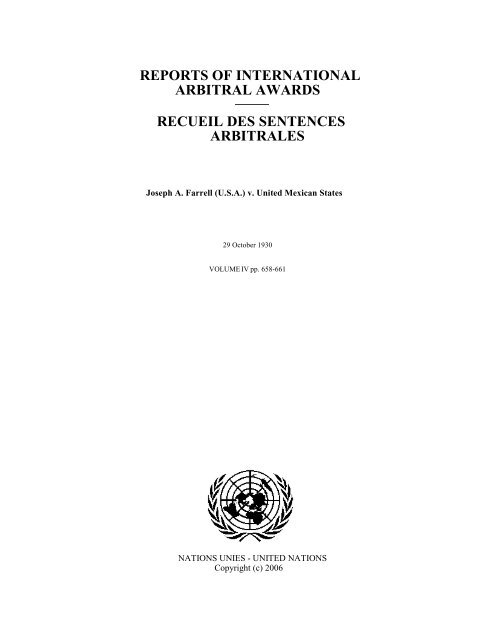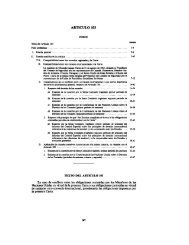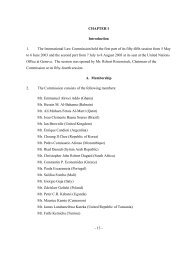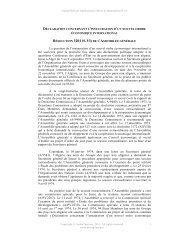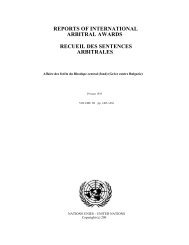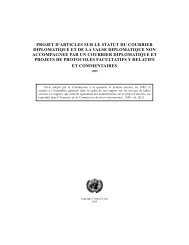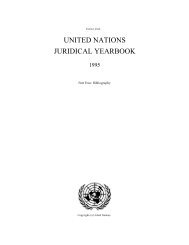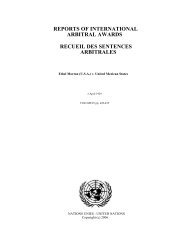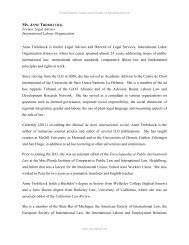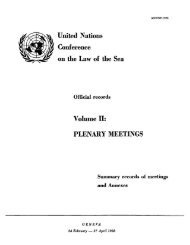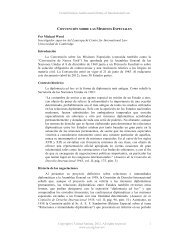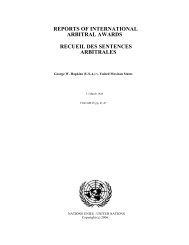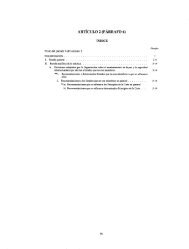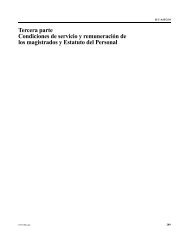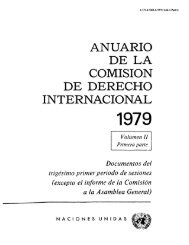Joseph A. Farrell (U.S.A.) v. United Mexican States - United Nations ...
Joseph A. Farrell (U.S.A.) v. United Mexican States - United Nations ...
Joseph A. Farrell (U.S.A.) v. United Mexican States - United Nations ...
Create successful ePaper yourself
Turn your PDF publications into a flip-book with our unique Google optimized e-Paper software.
REPORTS OF INTERNATIONAL<br />
ARBITRAL AWARDS<br />
RECUEIL DES SENTENCES<br />
ARBITRALES<br />
<strong>Joseph</strong> A. <strong>Farrell</strong> (U.S.A.) v. <strong>United</strong> <strong>Mexican</strong> <strong>States</strong><br />
29 October 1930<br />
VOLUMEIV<br />
pp. 658-661<br />
NATIONS UNIES - UNITED NATIONS<br />
Copyright (c) 2006
658 MEXTCO/U.S.A. (GENERAL CLAIMS COMMISSION)<br />
Decision<br />
The Government of the <strong>United</strong> <strong>Mexican</strong> <strong>States</strong> shall pay to the Government<br />
of the <strong>United</strong> <strong>States</strong> of America on behalf of Mrs. Elmer Elsworth<br />
Mead (Helen O. Mead) the sum of $,8000.00 (eight thousand dollars),<br />
without interest.<br />
JOSEPH A. FARRELL (U.S.A.) v. UNITED MEXICAN STATES<br />
(October 29, 1930. Pages 157-161.)<br />
DENIAL OF JUSTICE.—CORRECTION OF ERRORS OF LOWER COURT BY COURT<br />
OF LAST RESORT.—ILLEGAL ARREST.—MISTREATMENT DURING IMPRISON-<br />
MENT.—DETENTION Incomunicado.—INTERNATIONAL STANDARD. Claimant<br />
was arrested on several charges, convicted on one of these, but acquitted<br />
by Supreme Court of the State of Zacatecas and thereafter released.<br />
American Agency contended that such decision of the final court could<br />
not correct errors of arresting claimant without probable cause,<br />
mistreatment during imprisonment, and detention incomunicado for twenty<br />
days. Held, denial of justice not established in view of final acquittal of<br />
claimant, and errors referred to by American Agency not established.<br />
In so far as the detention incomunicado was concerned, since some communication<br />
was permissible subject to certain safeguards and since it did<br />
not totally prevent the accused from having an attorney to defend him.<br />
such detention did not fall below the international standard.<br />
Cross-references: Am. J. Int. Law, Vol. 26, 1932, p. 639; Annual Digest,<br />
1929-1930, p. 256.<br />
Comments: Edwin M. Borchard, "Recent Opinions of the General Claims<br />
Commission, <strong>United</strong> <strong>States</strong> and Mexico", Am. J. Int. Law, Vol. 25, 1931.<br />
p. 735 at 738.<br />
Commissioner Fernandez MacGregor, for the Commission :<br />
The <strong>United</strong> <strong>States</strong> of America, on behalf of <strong>Joseph</strong> A. <strong>Farrell</strong>, an American<br />
citizen, claims from the <strong>United</strong> <strong>Mexican</strong> <strong>States</strong> the amount of $10,000.00.<br />
<strong>United</strong> <strong>States</strong> currency, alleging that he was unlawfully arrested and<br />
subjected to harsh and severe treatment during the period of his imprisonment<br />
by <strong>Mexican</strong> authorities.<br />
The claimant was the master mechanic of the "La Fe Mining Company "<br />
which operated in Guadalupe, Zacatecas, Mexico. On October 22, 1910.<br />
the claimant was on duty inspecting the raising and lowering of a tank.<br />
One of the <strong>Mexican</strong> laborers named Calvillo executed his task improperly<br />
for which he was reprimanded by the claimant who also struck him on the<br />
shoulder; this resulted in a dispute which culminated in two consecutive<br />
physical encounters between the two men. On the following day Calvillo<br />
went to the Company's warehouse which was in charge of a French citizen<br />
named Langot, asking his permission to speak to the claimant, which Langot<br />
refused. Calvillo became threatening whereupon Langot went to the claimant<br />
and asked him for his revolver; <strong>Farrell</strong> adviser him to call the police,<br />
which he did; but as the police did not arrive and as Calvillo's attitude
MEXICO/U.S.A. (GENERAL CLAIMS COMMISSION) 659<br />
became more threatening, Langot again asked the claimant for his revolver,<br />
this time obtaining it, and went out again. Calvillo tried to enter at alJ<br />
costs rushing towards the door whereupon Langot fired five shots at him<br />
killing him instantly.<br />
The <strong>Mexican</strong> authorities took cognizance of the crime instituting the<br />
corresponding proceedings during the course of which the claimant, on<br />
November 11, 1910, was arrested charged with (a) attempt to commit<br />
murder, (b) carrying prohibited weapons, and (c) being an accomplice to<br />
the murder of Calvillo. The Judge of the Court of First Instance, on February<br />
16, 1911, rendered a decision acquitting the claimant of the crimes<br />
of attempted murder and carrying prohibited weapons, and sentencing<br />
him as an accomplice to the murder of Calvillo to the penalty of ten years'<br />
imprisonment. The claimant appealed from that sentence and the Supreme<br />
Court of the State of Zacatecas, on April 4 of the same year, handed down<br />
its decision acquitting him of all the charges which had been made against<br />
him, for which reason he was released. The decision of the Supreme Court<br />
was a majority opinion, since one of the Justices voted to confirm the<br />
sentence of the lower court.<br />
The American Agency in its oral argument withdrew the imputation made<br />
in its brief that the <strong>Mexican</strong> Judge of the Court of First Instance harbored<br />
racial prejudice against American citizens which impelled him to convict<br />
<strong>Farrell</strong>.<br />
In the same oral argument mention was made that the Commission has<br />
established the precedent that certain irregularities of procedure cannot<br />
be redressed even when a final sentence doing justice is rendered, referring<br />
especially to the Dyches case in which the following was said:<br />
"Moreover, in this case of an alleged illegal trial and defective administration<br />
of justice, the Commission finds itself confronted with a decision of the<br />
Supreme Court of Justice of Mexico,—the highest court in the nation, and<br />
in fact one of the three branches into which its Government is divided,—in<br />
which decision final justice is granted correcting the error that the local lower<br />
Courts may have made in finding the claimant guilty. Bearing this in mind,<br />
it might be said that there is no denial of justice in this case, but on the contrary,<br />
a meting out and fulfillment of justice. If the term within which all proceedings<br />
against Dyches were effected had been a reasonable one, it would be necessary<br />
to apply hereto the principle establishing the nonresponsibility of a State for<br />
the trial and imprisonment of an alien, even though he is innocent, provided<br />
there has been probable cause for following such procedure The Supreme<br />
Court of Justice of the <strong>Mexican</strong> nation finally applied the law, conscientiously<br />
examining the charges made against Dyches and found him innocent, for which<br />
reason he would have no right to ask for indemnification for the deplorable<br />
error of the local courts which injured him. All the defects of procedure of which<br />
the claimant complains were, so to say, erased by the last decision which rendered<br />
justice to him. Thus, there is no need to consider the propriety or impropriety<br />
of the interpreters employed not meeting the requirements prescribed by the<br />
law, nor of taking into account that this or that legal step was not taken."<br />
(Majority opinion, Opinions of Commissioners, 1929.)<br />
"No doubt it is a general rule that a denial of justice can not be predicated<br />
upon the decision of a court of last resort with which no grave fault can be<br />
found. It seems to me, however, that there may be an exception, where during<br />
the course of legal proceedings a person may be the victim of action which in<br />
no sense can ultimately be redressed by a final decision, and that an illustration<br />
of such an exception may be found in proceedings which are delayed beyond<br />
all reason and beyond periods prescribed by provisions of constitutional law."<br />
(Opinion of Commissioner Nielsen, Op. cit.).<br />
43
660 MEXICO/U.S.A. (GENERAL CLAIMS COMMISSION)<br />
Based on this opinion the American Agency alleged that in the instant<br />
case, the Commission, in accordance with the principles of international<br />
law, could examine the final decision rendered by the Supreme Court of<br />
Zacatecas for the following reasons: 1, because the evidence submitted<br />
against the claimant in the Court of First Instance was so unsatisfactory<br />
as to warrant his immediate release; 2, because during the period of his<br />
detention the claimant was subjected to ill treatment; and 3, because he<br />
was held incomunicado for a period of twenty days.<br />
The Commission finds at once that the instant case differs from the Dyches<br />
case, Docket No. 460, in the fact that in that case it was proven that the<br />
judicial proceedings were unduly delayed in violation of the <strong>Mexican</strong> law;<br />
in the instant case it appears that the proceedings were conducted entirely<br />
within the period designated by the law, the proceedings in both courts<br />
having lasted approximately five months. In this regard the Attorney of<br />
the American Agency stated:<br />
"The proceedings, it would seem to me, were conducted with unusual celerity,<br />
There was no cause of complaint regarding delay. The case commenced<br />
October 23, 1910, and was finally disposed of by a decision of the Supreme<br />
Court on April 5, 1911. So I really think it was very quick action on the whole."<br />
Entering upon an examination of the alleged injuries of the claimant,<br />
the Commission is of the opinion that there was probable cause for his<br />
arrest. Against him were the statements of several witnesses to the effect<br />
that they had seen him quarrel and struggle with Calvillo; the latter had<br />
been killed by Langot with the pistol of the claimant who had previously<br />
shown him how to use it. The Penal Code of Zacatecas considers as accomplices<br />
those who "furnish the instruments, arms or other means adequate<br />
for the commission of the crime .... if they know the use which is to be made<br />
of such instruments or means". The American Agency argues that the<br />
claimant did not know for what purpose Langot required his revolver.<br />
This was an essential fact which had to be established during the course<br />
of the proceedings. Now, if there was probable cause for the arrest, and if<br />
the proceedings were in accordance with the laws of Mexico, there is no<br />
violation of international law, since an alien is subject to all the penal laws<br />
of the country in which he lives, provided these are applied bona fide, and<br />
even though a charge is not proven.<br />
As to the other part, there is not sufficient evidence to establish that the<br />
claimant was subjected to physical ill-treatment during his imprisonment,<br />
inasmuch as the affidavits on this point lack the precision required to sustain<br />
the allegation.<br />
Finally, the charge against the respondent Government with relation<br />
to the holding of the claimant incomunicado for twenty days, must likewise<br />
be considered as not sustained. The American Agency even asserted that<br />
the <strong>Mexican</strong> law which permitted incomunicaciôn for such a long period<br />
"is below the required standards with respect to the treatment to be accorded<br />
to aliens subjected to prosecution", insisting that prolonged incomunicaciôn<br />
deprives the accused of the right of defense.<br />
The Commission is not prepared to state that a law which permits the<br />
incomunicaciôn of an accused in a manner implying neither cruelty nor interference<br />
with the right of defense, is in violation of international law. The<br />
incomunicaciôn permitted by the Code of Criminal Procedure of Zacatecas<br />
(Article 340) must take place in such a manner as not to prevent the giving<br />
to the person so held all the assistance compatible with the object of that
MEXICO/U.S.A. (GEJVERAL CLAIMS COMMISSION) 661<br />
measure ; the person held incomunicado may speak to other persons or communicate<br />
with them in writing, in the discretion of the Judge, provided that<br />
the conversation takes place in the presence of this official or that the letters<br />
be sent through him unsealed. Under these conditions, and if it does not<br />
totally prevent the accused from having an attorney to defend him, incomunicaciôn<br />
does not imply a violation of international law. In the instant case<br />
the incomunicacion suffered by the claimant took place in accordance with<br />
the law during the first days of the proceedings, from November 11, to<br />
December 1, 1910. It is of record that the accused was able to defend himself<br />
fully from the beginning to the end of the proceedings, and that finally,<br />
by virtue of that defense, he was acquitted. There is, therefore, no cause<br />
for responsibility chargeable to the <strong>Mexican</strong> Government, on this ground.<br />
In view of the foregoing, the instant claim must be disallowed.<br />
Decision<br />
The claim of the <strong>United</strong> <strong>States</strong> of America on behalf of <strong>Joseph</strong> A. <strong>Farrell</strong><br />
is disallowed.<br />
GEORGE W. COOK (U.S.A.) v. UNITED MEXICAN STATES<br />
(November 5, 1930. Pages 162-167.)<br />
CONTRACT CLAIMS.—COMPUTATION OF AWARD.—AWARD CALCULATED AS<br />
OF TIME CONTRACT DEBTS WERE PAYABLE.—RATES OF EXCHANGE.—<br />
PROOF OF FOREIGN LAW. Claim for goods sold and delivered to respondent<br />
Government. Latter produced evidence as to rates of exchange during<br />
period in question. Claimant Government contended goods were acquired<br />
and selling price computed on a gold basis. Held, award should be in<br />
amount of losses sustained by the claimant because of the non-fulfilment<br />
by respondent Government of its obligations when they arose.<br />
INTEREST. Interest awarded from date of latest invoice in the record to<br />
the date on which the last award is rendered by the tribunal.<br />
Commissioner Nielsen, for the Commission:<br />
In the Memorial filed in this case it is stated that claim is made in the<br />
amount of $11,782.95 gold currency of the <strong>United</strong> <strong>States</strong>, due to George W.<br />
Cook, for merchandise sold and delivered to Departments of the Government<br />
of Mexico by the mercantile house of Mosler, Bowen and Cook, Sucr.,<br />
of the City of Mexico. However, the claim is made up of a large number<br />
of items, and among those listed and supported by evidence are some for<br />
services rendered at the request of <strong>Mexican</strong> authorities. The substance<br />
of the allegations of the Memorial with respect to the sums for which compensation<br />
is sought is as follows:<br />
The invoices covering the merchandise sold and delivered were approved<br />
by the respective departments of the Federal Government, but the Government<br />
of Mexico has refused to pay the invoices, although repeatedly requested<br />
to do so. Much if not all of the merchandise, consisting almost entirely of<br />
office and household furniture, fittings, fixtures, equipment and utilities, is


